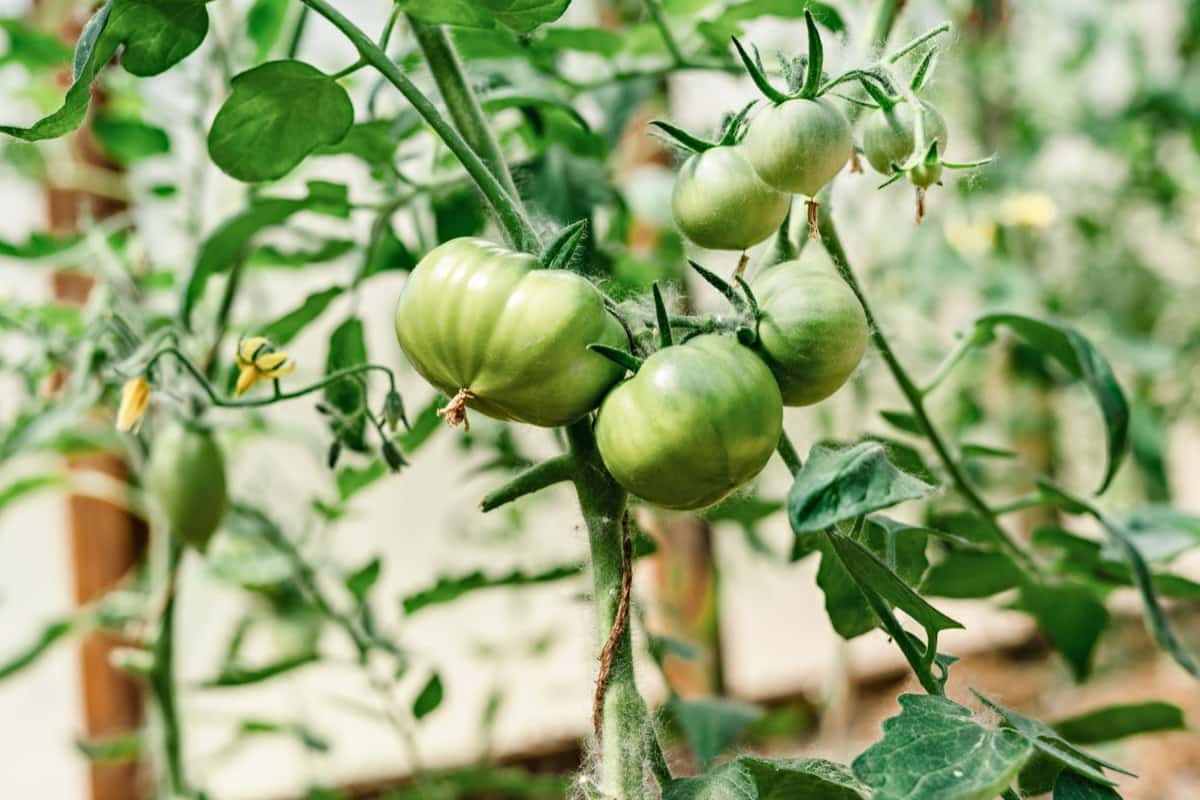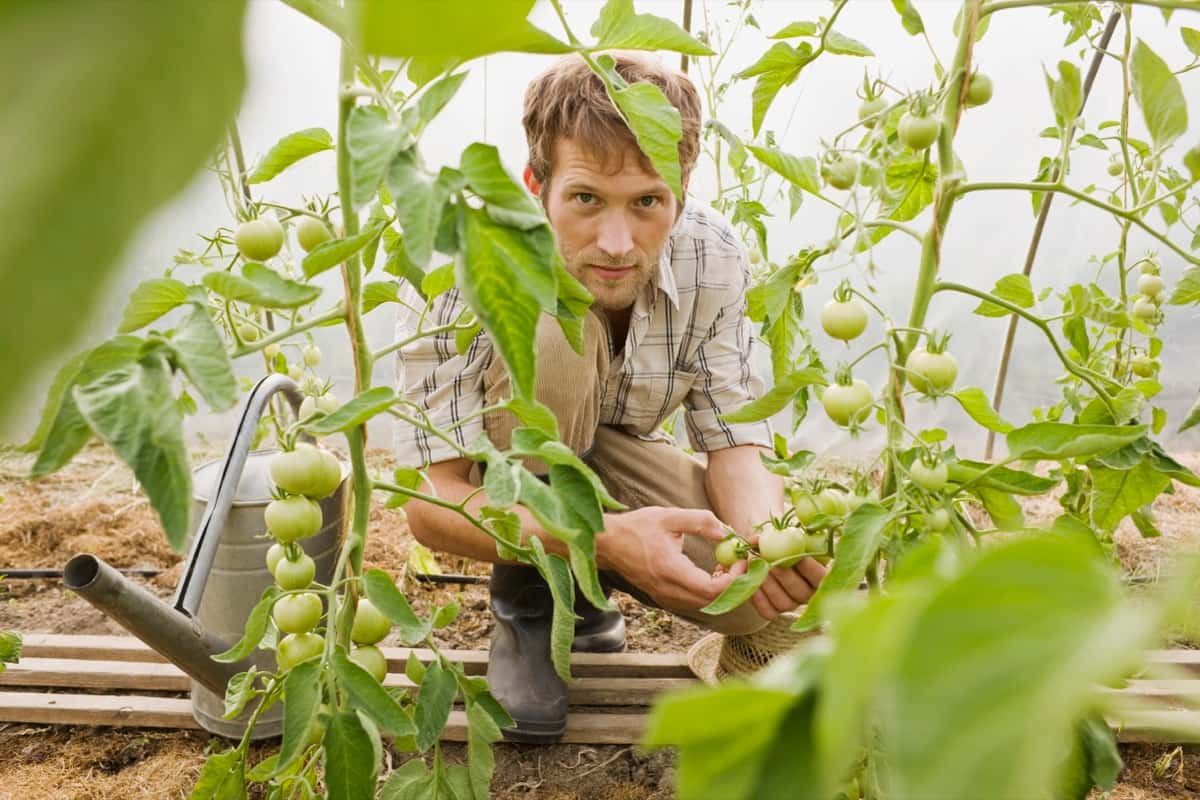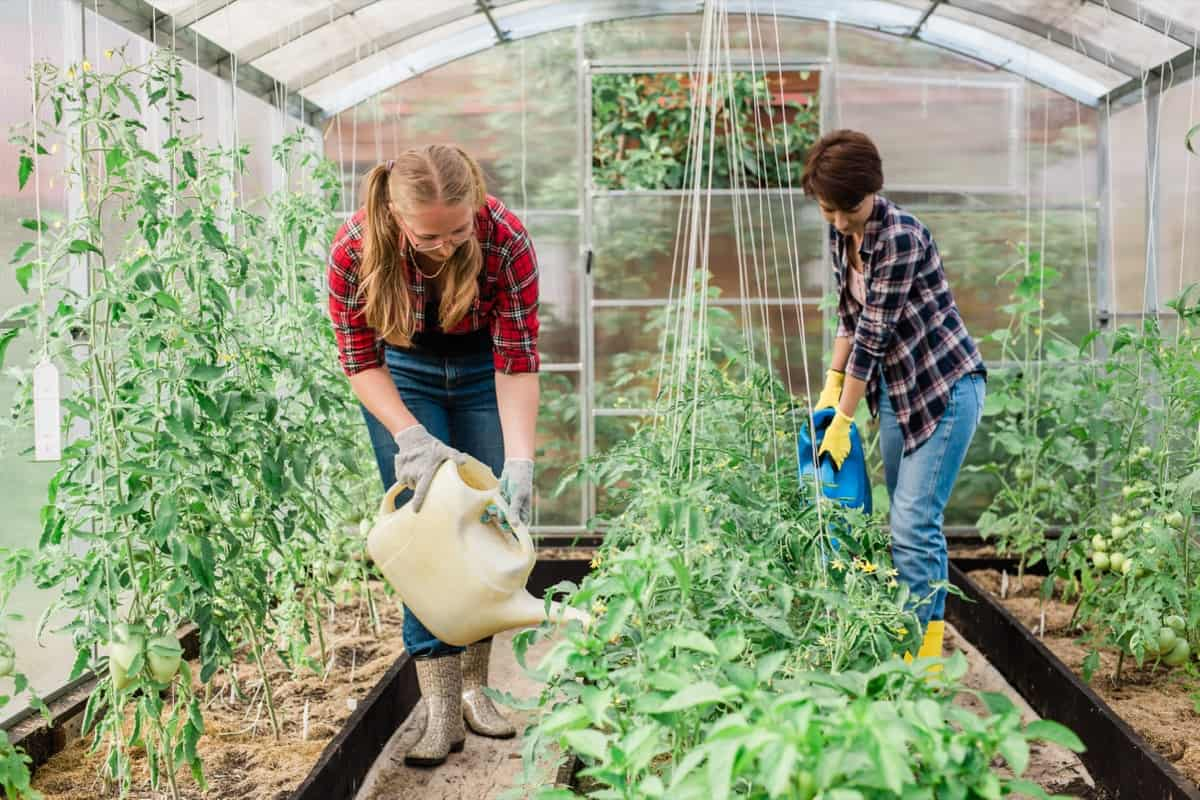Most tomatoes will turn red six to eight weeks after the flowers have been pollinated. Sometimes, however, the days go by, and the tomatoes don’t seem to be ripening as they should, even though they should. There are a number of reasons why tomatoes don’t ripen on the vine, and here are the most common ones.

9 Reasons Why Your Tomatoes Aren’t Ripening
Insufficient Sunlight and Tomato Ripening Delays
Ripening tomatoes requires a lot of sunlight. The more sunlight they receive, the faster they ripen. If the tomato plant is not getting enough sunlight, then the tomatoes may take longer to ripen. This can be a problem if you are growing tomatoes and are expecting a harvest at a certain time. One option is to choose a location with plenty of sunlight throughout the day. Tomatoes need at least six hours of sunlight daily to ripen properly. If this is impossible, you can also use reflective materials to redirect sunlight toward the plants.
Temperature Fluctuations Hindering Tomato Maturation
Tomatoes require specific temperature ranges to mature properly. Temperatures that are too low can slow the ripening process, while temperatures that are too high can cause the tomatoes to become overripe and even rot. Tomatoes require warm temperatures to ripen properly. If the temperature drops below 13°C or rises above 33°C, ripening may be delayed or even halted. Inconsistent temperatures can also cause plant stress, leading to a decrease in yield and an increase in susceptibility to diseases and pests.
It is important to provide a stable environment for tomato plants to combat temperature fluctuations. This can be done by controlling the temperature in the greenhouse or using shade cloth to regulate the amount of sunlight the plants receive. Monitoring the temperature regularly and adjusting as needed is also important. This can be done using a thermometer or a digital temperature controller.
Nutrient Deficiencies Affecting Tomato Ripening Process
Nutrient deficiencies can have an accountable impact on the ripening process of tomatoes. In particular, deficiencies in calcium, potassium, and magnesium can all affect the quality and timing of tomato ripening. Calcium is essential for strong cell walls; without it, tomatoes may not ripen correctly. Calcium deficiency can cause blossom end rot, where the end of the tomato opposite the stem becomes black and sunken. This can cause the tomato to ripen unevenly or not at all.
Potassium is also critical for tomato ripening. It helps regulate the plant’s water balance and activates enzymes in ripening. A potassium deficiency can result in slower ripening, smaller fruit, and reduced yields. To prevent nutrient deficiencies from affecting tomato ripening, it is essential to maintain proper soil fertility and pH levels. Regular soil testing can help identify any deficiencies and allow for appropriate amendments to be made.
Inadequate Watering Practices and Delayed Tomato Ripening
One of the biggest problems with inadequate watering practices is that they can cause delays in tomato ripening. When tomatoes do not receive enough water, they become stressed, slowing their ripening. This can result in smaller, less flavorful, and less juicy tomatoes than they should be. When watering your tomatoes, it is best to do so deeply and infrequently. This means giving them a good soaking of about 1-2 inches of water once a week rather than lightly watering them daily. It is also important to water them at the base of the plant rather than from above.
In case you missed it: 9 Reasons Why Your Tomato Leaves Turning Black: Treatment, Natural, Organic Control Methods

Tomato Variety Selection and Its Impact on Ripening Time
In terms of tomato varieties, there are no two that are alike. There are hundreds of varieties of fruit available, each of which has its own ripening time. Due to the smaller size of cherry tomatoes, they ripen more quickly than the large varieties, as they have a shorter lifespan. In addition, some varieties have been bred to ripen quickly, while others may take much longer to reach the stage when they are ready for picking.
In the seed packet of your variety, you should be able to find information about when the fruit will ripen. You must note down this date after planting so that you will know when your tomatoes will be ready to pick. In that way, you can tell if you are facing a ripening issue or need to wait a bit longer.
Ethylene Gas and Its Role in Tomato Fruit Ripening
When tomatoes are harvested, they are typically still green and unripe. However, as they are exposed to air, they begin producing ethylene gas, which triggers a series of chemical reactions that lead to ripening. Ethylene gas helps to break down complex carbohydrates and other compounds in the tomato, making it softer and sweeter. It also causes the tomato to change from green to red, signaling that it is now ripe and ready to eat.
Tomato Pests and Diseases Causing Hindered Ripening
- Hornworm: These large green caterpillars can devour entire tomato plants if unchecked. The best way to control them is by handpicking or using biological controls such as parasitic wasps.
- Tomato Fruitworm: These tiny insects feed on developing fruit, causing it to rot before it can fully ripen. Pheromone traps and insecticides can be effective in controlling these pests.
- Blossom End Rot: It is caused due to calcium deficiency. It causes a dark, sunken spot on the bottom of the tomato fruit, which can lead to hindered ripening. The best way to treat blossom end rot is by adding calcium to the soil or using a calcium-rich fertilizer.
- Late Blight: This disease is caused by a fungus that attacks the foliage and fruit of the tomato plant, causing dark spots and a rotten smell. Organic treatments for Late Blight include copper-based fungicides and neem oil.
Improper Pruning Techniques and Delayed Tomato Maturation
One common mistake is to prune too much, leading to stunted growth and reduced fruit production. Another mistake is to prune at the wrong time, which can damage the plant and delay maturation. To avoid these problems, it is important to learn proper pruning techniques and to prune at the right time. This will help ensure your tomato plants stay healthy and produce the best possible fruit.
Delayed tomato maturation can also be a problem for growers. This can occur for various reasons, including poor soil conditions, lack of sunlight, and improper watering. Providing your tomato plants with the right conditions is important to avoid delayed maturation. This includes ensuring that they receive enough sunlight, water, and nutrients and that the soil is properly prepared and fertilized.
Harvesting Tomatoes Too Early and Its Impact on Ripening
Their green color and hard texture often characterize tomatoes harvested too early. This is because they have little time to develop and ripen on the vine fully. As a result, tomatoes that are picked too soon may have a lower sugar content and a less developed flavor profile.
In addition to impacting flavor and texture, harvesting tomatoes too early can also affect their size and color. Tomatoes not allowed to ripen on the vine fully may not reach their full potential size and may also lack the vibrant red color typically associated with ripe tomatoes. To avoid harvesting tomatoes too early, waiting until they have fully ripened on the vine is important.
In case you missed it: Frequently Asked Questions About Growing Cherry Tomatoes from Seed to Harvest

Conclusion
Your tomatoes are not ripening now that you know why. Whether the tomatoes are still on the vine or not, you also know some ways to solve the problem. Be patient – your neighbors’ tomatoes may ripen before yours if they have fast-maturing varieties. Keep track of your planting dates and days to maturity so you know when to worry about slow ripening.
- Feed Your Flock for Less: Top 10 Tips to Save on Chicken Feed
- Ultimate Guide to Ossabaw Island Hog: Breeding, Raising, Diet, and Care
- Hatching Answers: The Top 10 Reasons Your Chickens Aren’t Laying Eggs
- Eggs and Economics: Breaking Down the Cost of Raising Backyard Chickens
- Defend Your Greens: Proven Methods to Keep Iguanas Out of Your Garden
- Ultimate Guide to Cinnamon Queen Chicken: A Comprehensive Guide for Beginners
- Ultimate Guide to California Tan Chicken: Breeding, Raising, Diet, Egg-Production and Care
- Ultimate Guide to Marsh Daisy Chicken: Breeding, Raising, Diet, and Care
- 10 Types of Chicken Farming Businesses You Can Start for Profits